Add this eBook to your basket to receive access to all 846 records. Our indexes include entries for the spelling dudley. In the period you have requested, we have the following 846 records (displaying 691 to 700): These sample scans are from the original record. You will get scans of the full pages or articles where the surname you searched for has been found. Your web browser may prevent the sample windows from opening; in this case please change your browser settings to allow pop-up windows from this site. Residents of Surrey
(1895)
Kelly's Directory of Surrey includes this alphabetical Court Directory, listing private residents in the county. In fact, this listing is a little more comprehensive than the main directory, in that it includes residents of some London suburbs that, although in the county of Surrey, are not included in the Surrey directory. Residents are listed surname first, then christian name or initials, and postal address. | Sample scan, click to enlarge

| Boys entering Merchant Taylors' School in London
(1896)
Merchant Taylors' School was founded by members of the livery company of the merchant taylors of the city of London in 1561 as a grammar school. By the 19th century this was a major English public school. In 1875 the school removed from Suffolk Lane, in the City, to a new building in Charterhouse Square in Finsbury. In 1907 the Reverend William Baker, a former headmaster, published this school register for the period 1871 to 1900, which we have indexed by year of admission. Each entry gives the boy's name in full (surname, christian name(s)); date of birth; names of both parents (middle names as initials); occupation of father; career summary; and (in italics) address as of 1907. | Sample scan, click to enlarge

| Merchants and traders in Newcastle-upon-Tyne
(1515-1898)
The society of Merchant Adventurers of Newcastle-upon-Tyne consisted of those who had obtained freedom of the city (allowing them to trade there) by birth as a son of, or apprenticeship, to a freeman: and within that, freedom of one of the three 'trades', i. e. boothman, draper or mercer. F. W. Dendy prepared extracts from the merchant adventurers' records, the second volume, published by the Surtees Society in 1899 containing extracts from the minute books relating to the history of the merchants' court, an account of the long-standing dispute between the Newcastle company and the London company, some extracts relating to the relations between the Newcastle company and the Eastland Company (who had a monopoly of the trade with Russia and the Baltic), copies of the oaths used by the Newcastle company, the London company and the Eastland Company, and (pages 185 to 381) a list of the apprentices enrolled in, and of the freemen admitted to, the Newcastle company. This list is arranged in a table of seven columns: Name of Apprentice; Name of Father of Apprentice and Observations (particularly, instances where an apprentice is passed over to a new master during his apprenticeship); Master; Boothman (B.), Draper (D.) or Mercer (M.); Date of Indentures: Enrolment: Admission. All the dates are normalised to New Style, i. e. to the modern calendar. Finally, there is a list of sons and apprentices of members who, having thus acquired the right of freedom of the city, took up the freedom, but did not assume the freedom of any of the three trades. The index covers all the contents of the volume, not just the apprentice and freemen lists. | Sample scan, click to enlarge

| Ackworth Old Scholars: Yorkshire Quarterly Meeting
(1898)
The Quaker school at Ackworth in Yorkshire commenced in 1779. At the General Meeting of 1882 the Ackworth Old Scholars' Association was established, and a full list of members was printed in their annual proceedings. This list, corrected to 1 October 1898, gives full names (including married women's maiden surnames) and addresses, arranged, for those living in England, by quarterly meeting, and then with separate lists for England, Scotland, and other countries. We have indexed these separately, and included maiden surnames. | Sample scan, click to enlarge
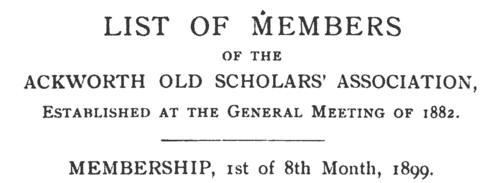
| Officers of the Royal Naval Reserve
(1898)
The Navy List, published by Authority, corrected to 18 December 1898, has this list of the officers on the Active List of the Royal Naval Reserve and of Honorary Officers of the reserve. Each officer's surname, christian name, and any middle initial(s) is given; with rank, and date of seniority in that rank. The ranks are: A E, Assistant Engineer; E, Engineer; Hon A P, Honorary Assistant Paymaster; Hon Ch E, Honorary Chief Engineer; Hon Cr, Honorary Commander; Hon L, Honorary Lieutenant; Hon P, Honorary Paymaster; Hon S L, Honorary Sub-Lieutenant; L, Lieutenant; Mid, Midshipman; S L, Sub-Lieutenant; Sen E, Senior Engineer. | Sample scan, click to enlarge
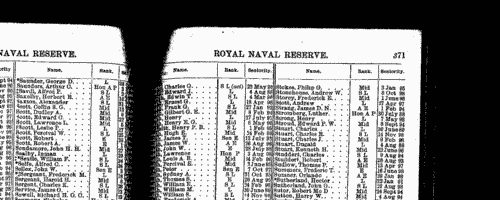
| Officers of the Royal Navy and the Royal Marines
(1898)
The Navy List, published by Authority, corrected to 18 December 1898, has this list of the officers on the Active List of the Royal Navy and the Royal Marines. Each officer's surname, christian name, and any middle initial(s) is given; with rank, date of seniority in that rank, and 'where serving', the last being the number of his ship. The ranks are: A, Admiral; A E, Assistant Engineer; A F, Admiral of the Fleet; A P, Assistant Paymaster; Art E, Artificer Engineer; As Ck, Assistant Clerk; B, Boatswain; Bandr, Bandmaster Royal Marines; C, Captain; Car, Carpenter; Ch, Chaplain; Ch B, Chief Boatswain; Ch Cr, Chief Carpenter; Ch E, Chief Engineer; Ch Gr, Chief Gunner; Ch P; Paymaster-in-Chief; Ck, Clerk; Cr, Commander; D I H, Deputy Inspector-General of Hospitals and Fleets; E, Engineer; E Ins, Inspector of Machinery; F E, Fleet Engineer; F P, Fleet Paymaster; F S, Fleet Surgeon; Gr, Gunner; H Sch, Head Schoolmaster; I H, Inspector-General of Hospitals and Fleets; L, Lieutenant; Mid, Midshipman; N C, Naval Cadet; N I, Naval Instructor; P, Paymaster; R A, Rear Admiral; S, Surgeon; S C, Staff-Captain; S Cr, Staff Commander; S E, Staff Engineer; S L, Sub-Lieutenant; S P, Staff Paymaster; S S, Staff Surgeon; Schm, Schoolmaster Royal Marines; St Ma, Sergeant Major Royal Marines; V A, Vice Admiral; W O, Warrant Officer Royal Marines. The column 'Where serving' also may have these abbreviations: AdC, Aide-de-Camp to the Queen; AO, Clerk to Secretary to a Flag Officer; CG, Coast Guard; CGP, Coast Guard Pension; DY, Dock Yard; GH, Greenwich Hospital; GHP, Greenwich Hospital Pension; GSP, Good Service Pension; NH, Naval Hospital; NID, Naval Intelligence Department; NP, Naval Pension (late Out-Pension of Greenwich Hospital); PW, Pension for Wounds; Sec, Secretary to a Flag Officer; TP, Travers Pension; TS, In the Transport Service; VY, Victualling Yard.
| Sample scan, click to enlarge
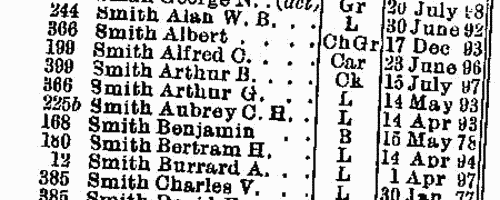
| Boys entering Truro School
(1880-1900)
Truro College was founded 19 January 1880; the name was changed to Truro School in 1931. In 1954 this register of old boys was published, arranged alphabetically by surname and then christian name (or initials), in bold; then years of entering and leaving the school, and, in many cases, address as in 1954. For this period little detail is given; occasionally an indication of occupation. | Sample scan, click to enlarge

| Long-Lost Relatives: Home Inquiries
(1900)
Each issue of Lloyd's Weekly News, of London, contained a column devoted to searches for Long-Lost Relatives. The inquiries were arranged in three groups: Home Inquiries (i. e., from correspondents in the United Kingdom); Colonial and Foreign Inquiries (from abroad); and Soldiers' and Sailors' Inquiries. Results from all these were grouped together as 'Answers to Inquiries'.
Each column was headed: 'Correspondents MUST give full addresses and the DATES OF THE INQUIRIES to which they refer. We cannot search back numbers, nor print inquiries for "missing husbands." These columns are not intended for inquiries in respect to claimants for money, and no agents, at home or abroad, have any connection with Lloyd's.' | Sample scan, click to enlarge

| Missing Next-of-Kin and Heirs-at-Law
(1900)
The Unclaimed Money Registry and Next-of-Kin Advertisement Office of F. H. Dougal & Co., on the Strand in London, published a comprehensive 'Index to Advertisements for Next of Kin, Heirs at Law, Legatees, &c., &c., who have been Advertised for to Claim Money and Property in Great Britain and all Parts of the World; also Annuitants, Shareholders, Intestates, Testators, Missing Friends, Creditors or their Representatives, Claimants, Unclaimed and Reclaimed Dividends and Stock, Citations, Administrations, Rewards for Certificates, Wills, Advertisements, &c., Claims, Unclaimed Balances, Packages, Addresses, Parish Clerks' Notices, Foreign Intestates, &c., &c.' The original list was compiled about 1880, but from materials dating back even into the 18th century: most of the references belong to 1850 to 1880. For each entry only a name is given, sometimes with a placename added in brackets: there may be a reference number, but there is no key by which the original advertisement may be traced. The enquirer of the time had to remit £1 for a 'Full and Authentic Copy of the Original Advertisement, together with name and date of newspaper in which the same appeared'. This appendix to the list was issued in about 1900. | Sample scan, click to enlarge
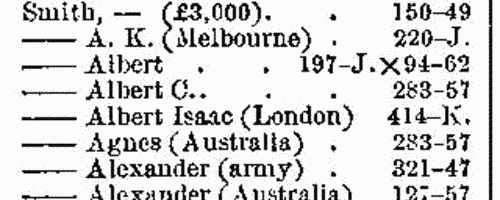
|  Outstanding soldiers of the 21st Hussars
(1881-1901) Outstanding soldiers of the 21st Hussars
(1881-1901)
Each year the best soldiers of the regiment were chosen for long service and good conduct medals. This register gives rank, name, regimental number, and date of recommendation. (The sample scan is from the East Surrey regiment). The register is essentially a register of recommendations, annotated with details of the issue of the medals. Where no gratuity accompanied the medal, the entry is marked 'W. G.' (without gratuity); where, for one reason or another, the medal was not issued, the entry is marked 'N. S.' (not sanctioned) and struck through. The regiment moved from England to Ireland in 1881. A detachment to the Light Camel Corps served in the Nile Expedition of 1884-1885. The 21st Hussars were at Cahir in 1885, embarked for India 23 November 1887, and were based at Secunderabad by 1895 (the home depot was at Canterbury). Transferred to Egypt in 1896, the regiment was renamed the 21st Lancers in 1897: having been moved south into the Soudan, the troops took part in the battle of Khartoum in 1896, adding "Khartoum" to the regimental colours. In 1897 the regiment was renamed "Empress of India's Lancers". The troops were moved to Ireland in 1899. | Sample scan, click to enlarge
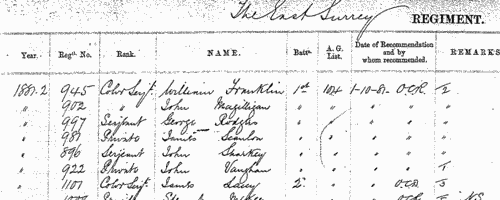
|
Research your ancestry, family history, genealogy and one-name study by direct access to original records and archives indexed by surname.
|












